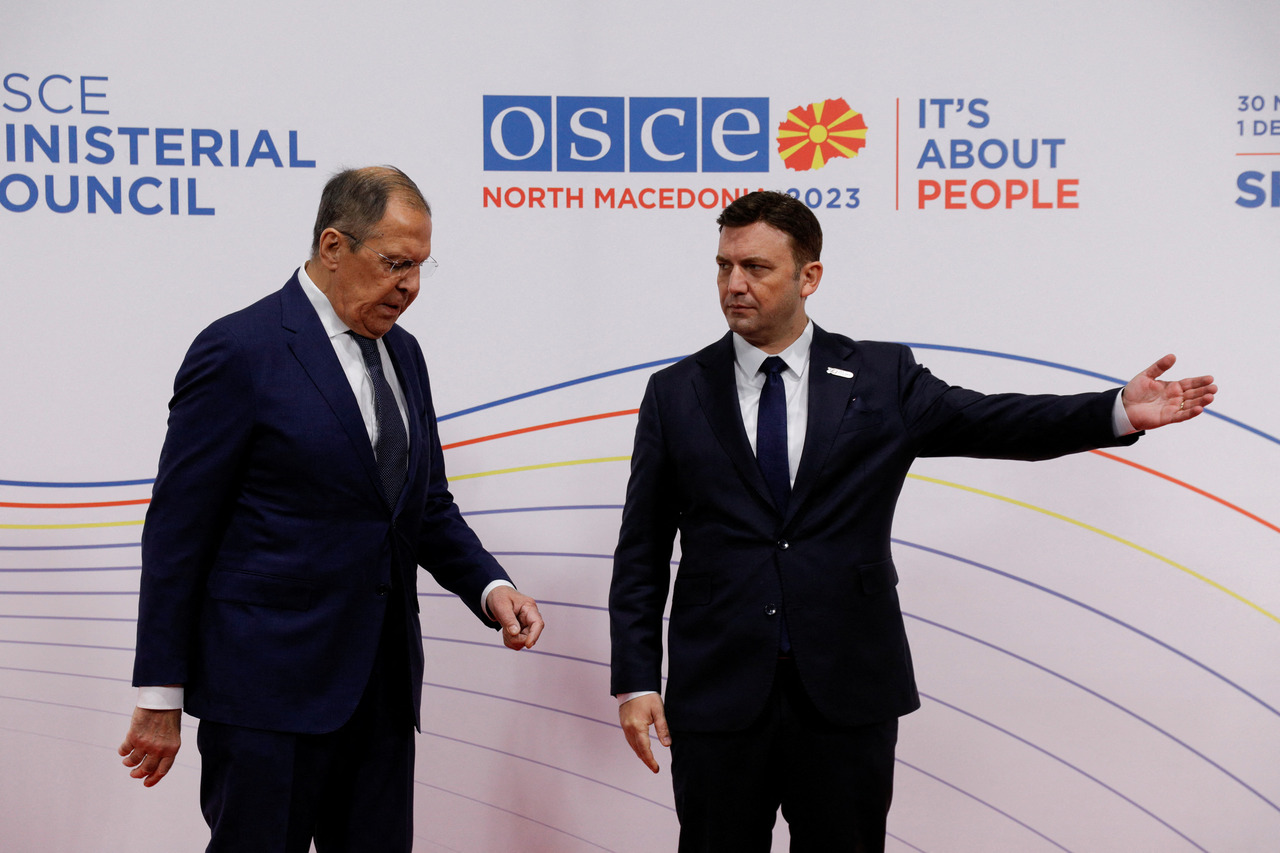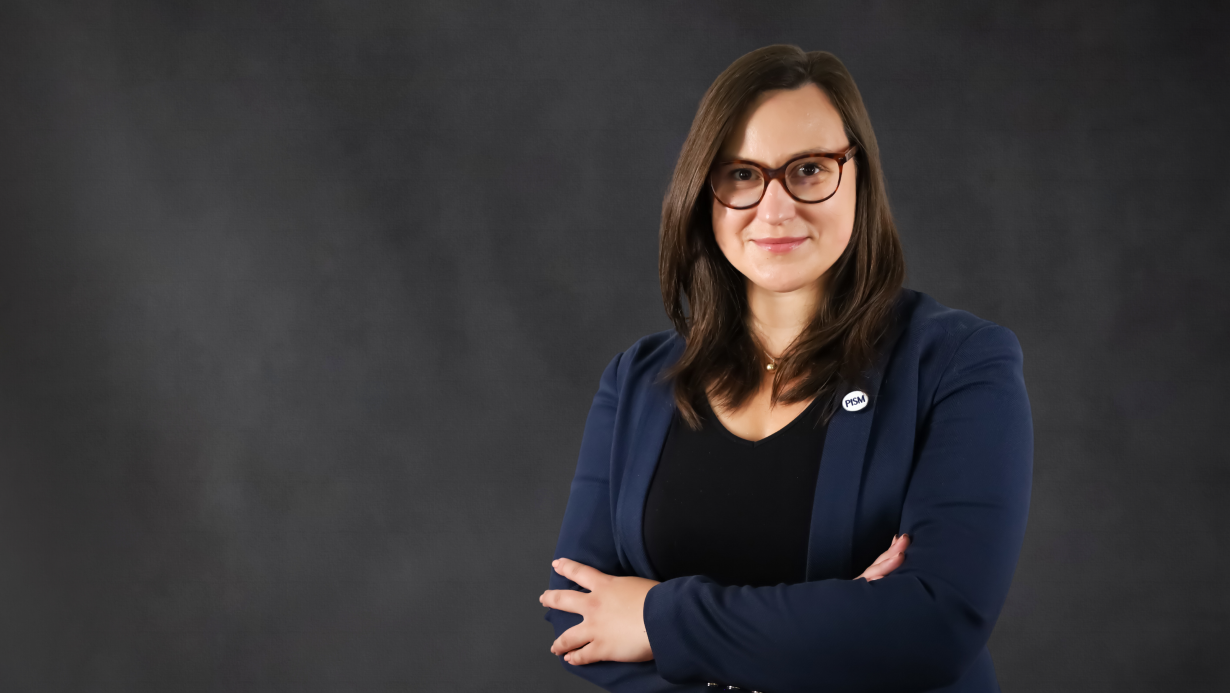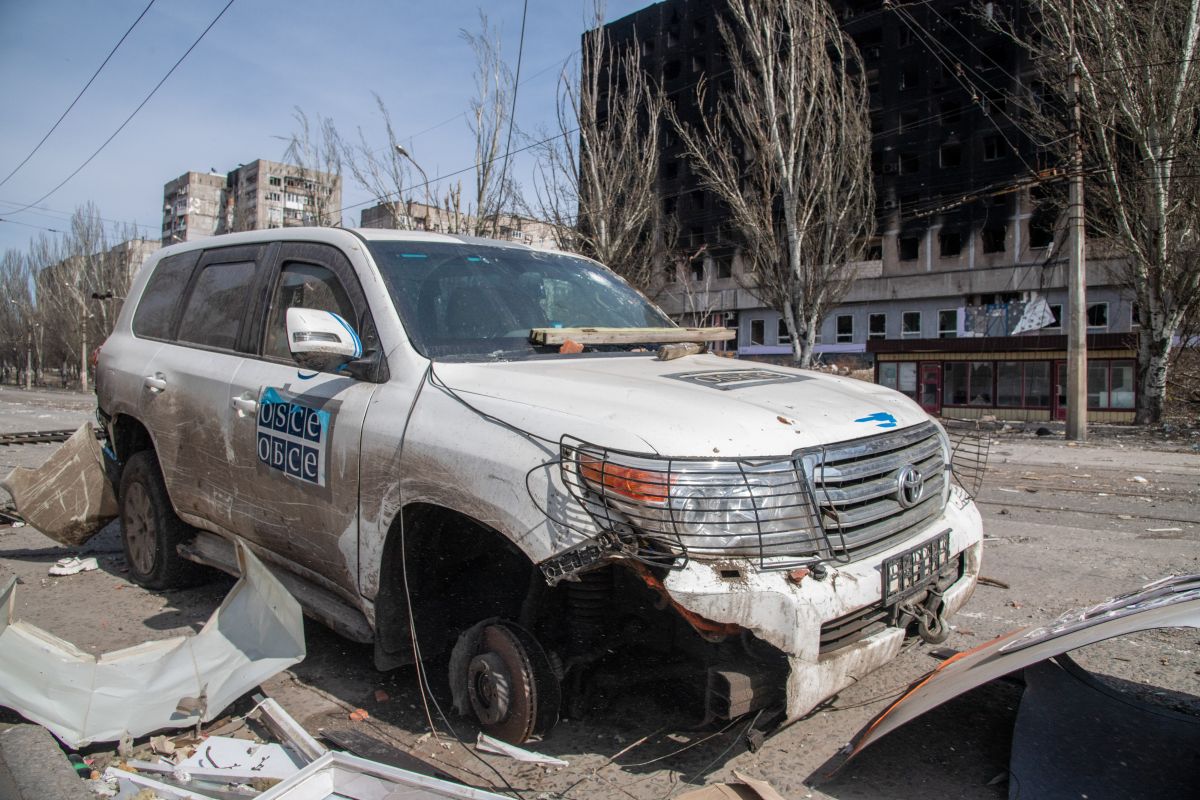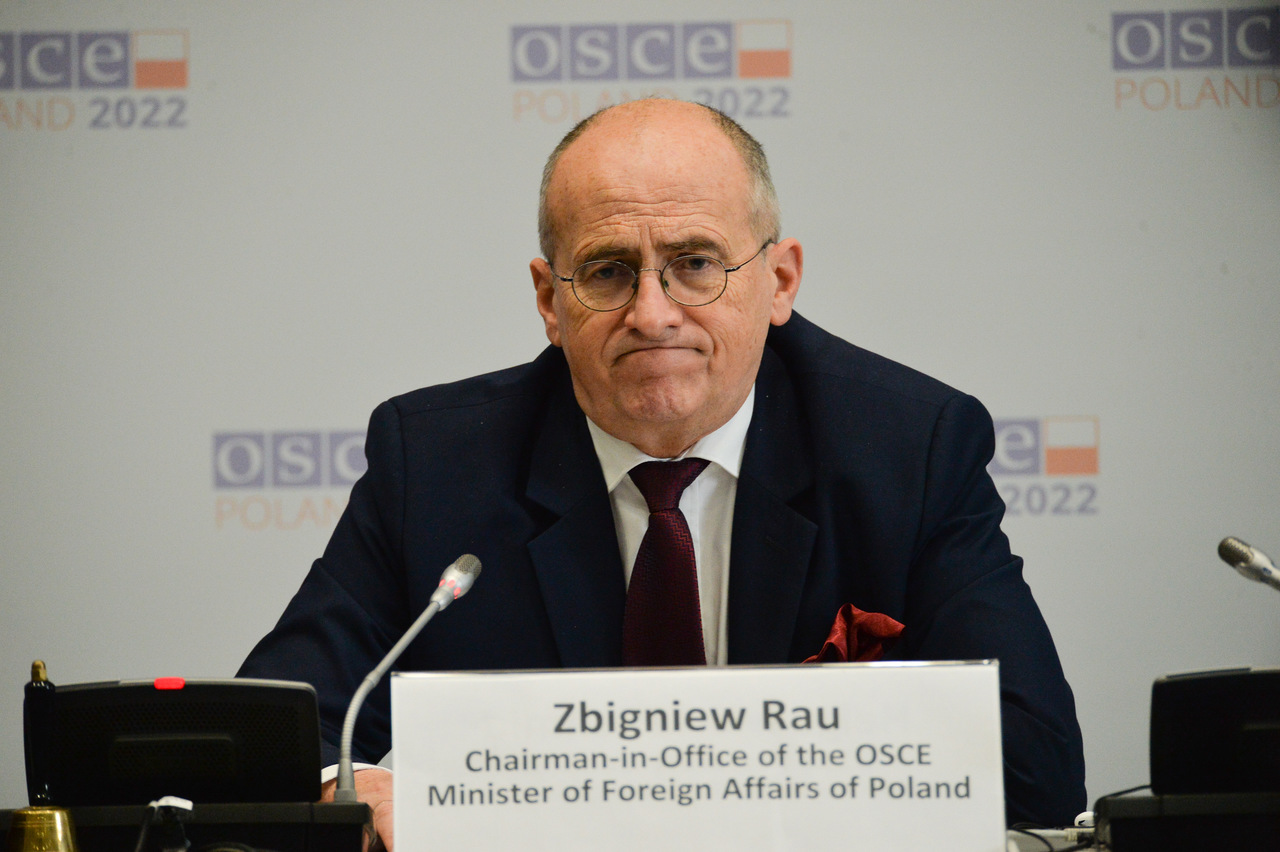Cohabitation with the Aggressor: Russia Stymies OSCE Operations
The weeks preceding the meeting of the OSCE Ministerial Council in Skopje on 30 November and 1 December presented an unprecedented challenge for the continued functioning of the organisation. This was due to Russia blocking the decision on electing the chair for 2024, appointing key functionaries, and establishing the budget. These problems have only been partially resolved and it can be assumed that Russia will continue to obstruct the organisation’s operations.
 OGNEN TEOFILOVSKI / Reuters / Forum
OGNEN TEOFILOVSKI / Reuters / Forum
Russia and the OSCE after the Attack on Ukraine
Russian aggression against Ukraine is a violation of, among other things, the CSCE Final Act, which is fundamental to the organisation. The actions of the aggressor are regularly condemned by the OSCE’s highest officials and most of its states. In response, Russia criticises the organisation as being dominated by EU and NATO states and no longer fulfilling the objectives for which it was set up. However, it does not seek to leave it because, by remaining in the OSCE, it can influence its functioning, which requires unanimity of its members in decision-making.
Russian participation in the work of the OSCE has been controversial. Some members criticised the issuing of visas to its representatives by Austria, where the organisation is headquartered, while others criticised Poland’s refusal to allow Foreign Minister Sergey Lavrov to come to Łódź for the OSCE Ministerial Council last year. North Macedonia invited him to the meeting in Skopje, arguing that Lavrov’s presence—his first visit to a NATO state since the full-scale invasion of Ukraine—would enable decisions to be taken on issues crucial to the continued operation of the OSCE. Although the U.S. contributed to a solution, Secretary of State Antony Blinken left Skopje before Lavrov’s arrival. North Macedonia's decision also prompted a boycott of the meeting by the foreign ministers of Ukraine, the Baltic States, and Poland (represented by ambassadors to the OSCE). Lavrov tried to use his participation in the meeting for propaganda purposes, for example, he announced that representatives of some Western countries had expressed a desire to hold bilateral talks with him. His visit, however, only confirmed Russia’s isolation in the OSCE—he is thought to have met only with the Armenian foreign minister, while delegates from Czechia, Romania, Ukraine, and others left the room as he spoke.
Decisions of the Ministerial Council in Skopje
The Council confirmed the agreement of the Ambassadors to the OSCE on 27 November to give Malta the chairpersonship in 2024, replacing Estonia, whose candidacy was blocked by Russia and Belarus. They accepted Malta, a non-NATO country that will find it difficult to exercise its role in parallel to being a member of the UN Security Council in 2023-2024 due to its modest staffing resources.
Consensus on the mandates of the four key OSCE officials, the so-called Top 4, was only reached at the end of the deliberations in Skopje. Faced with Russia blocking their reappointment for three years, North Macedonia proposed to extend their terms by one year. In the end, Secretary General Helga Maria Schmid, Head of the Office for Democratic Institutions and Human Rights (ODIHR) Matteo Mecacci, High Representative for National Minorities Kajrat Äbdyrakhmanov, and Representative for Freedom of the Media Teresa Ribeiro will serve just nine months longer, until 3 September 2024. This is a short-term solution, but thanks to it, the OSCE has temporarily avoided a repeat of the situation in 2020 when, due to vacancies, the duties of the Top 4 were carried out by their formal or informal deputies for several months.
Challenges for the OSCE
The lack of real opportunities for the OSCE to hold Russia accountable for violating the organisation’s rules and obstructing its work will encourage Russia to continue its aggressive and obstructive actions. This is highlighted by, among other things, its blocking of the adoption of the 2022 and 2023 budgets and its refusal to pay membership fees. In Skopje, states agreed on new quotas for 2024, but Russia vetoed the budget because of its “political narrative”. Until a consensus is reached on this issue, the OSCE will continue to operate on monthly allocations according to the 2021 budget (about €140 million; for comparison, the Council of Europe budget was €479 million in 2023). The use of provisional budget allows funding only for existing institutions and projects and does not take inflation into account, which hinders the proper functioning of the OSCE, including its human resources policy. The sponsorship of new initiatives and expenditures on which there is no unanimity (e.g., the aid programme for Ukraine) by groups of like-minded states is helpful. While this is important support, especially for the beneficiaries of these programmes, such projects are not formally OSCE activities.
Russia’s antagonism is also leading to a stalemate in the peace processes under the aegis of the OSCE on Abkhazia, South Ossetia, Transnistria, and the marginalisation of the Minsk Group dealing with the Nagorno-Karabakh conflict. This is linked to the lack of trust between the participants and the avoidance by the states involved, such as the U.S., of contact with Russian representatives, so as not to legitimise it as acting in good faith as a mediator. Russia’s damage to the OSCE’s stabilisation efforts also manifests itself in the blocking of the extension of its mission’s mandate in Ukraine, the illegal detention of three of its staff members since April 2022, and the seizure of about 70 of the mission’s vehicles.
Ukraine is demanding Russia’s removal from the OSCE. However, apart from the UN, it is the only organisation providing a forum for dialogue between Western countries and Russia, so the proposal is not supported by other OSCE members or its officers. Suspending or expelling Russia would not solve the organisation’s problems and would not remove the threat posed by Russia to European security. Blocking OSCE decisions, including on Russia’s membership, could be done by Belarus (in October, the two countries emphasised they were coordinating positions and activities in the organisation). Russia’s membership, on the other hand, allows for political pressure on Russia, enables the OSCE’s investigation and documentation of human rights violations and the organisation may prove useful in the peace process after the war ends.
Conclusions and Perspectives
The OSCE members, apart from Russia, agree on the need for the organisation, among other things, as a platform for non-like-minded states to interact and support political change in the Balkans and Central Asia. In this respect, the OSCE complements the competences of the EU and NATO. The challenge is to continue its activities. The concession to Russia in the form of Lavrov’s invitation to Skopje and the replacement of Estonia’s candidacy is a half success. The organisation has avoided the simultaneous absence of a chair and a Secretary General, which would have paralysed its functioning, but the solutions reached are makeshift. Instead of focusing on the substance, states will be forced to continue discussing organisational issues, including the budget and the filling of key positions. With the chairpersonship of the OSCE entrusted to Malta at the last minute, it will be particularly important for that country to cooperate within the troika with its predecessor and successor in planning its activities. As already agreed in 2021, Finland will hold the chairpersonship in 2025 in connection with the 50th anniversary of the signing of the Helsinki Final Act, so together with North Macedonia, it can offer valuable support to Malta.
Russia will continue to abuse the principle of consensus, encouraged by concessions and differences of approach between OSCE states, including NATO and EU members, which weaken their reactions to its actions. Decision-making in the OSCE will thus be conducted by seeking the lowest common denominator, on the basis of non-opposition instead of consent, at the actual price of further concessions to the aggressor. In view of the firm condemnation of Russian aggression and the obstruction of OSCE activities, however, the risk of legitimising these actions by cooperating it within the organisation seems low. In order for the OSCE not to be instrumentally used to spread propaganda by Russia for domestic and international use, it is necessary to constantly remind Russia of the need for it to comply with international law and to call for an end to its violations. In order to distance itself from the aggressor without blocking the OSCE, Poland can make so-called interpretative statements—clarifications to joint decisions—that cooperation does not mean legitimising Russia’s violations. It may also encourage other OSCE states to do so. Greater involvement of the South Caucasus and Central Asia states in joining joint statements and initiatives of the EU states and, in the longer term, in leading the OSCE is also worth considering, which may facilitate consensus on the Top 4.





